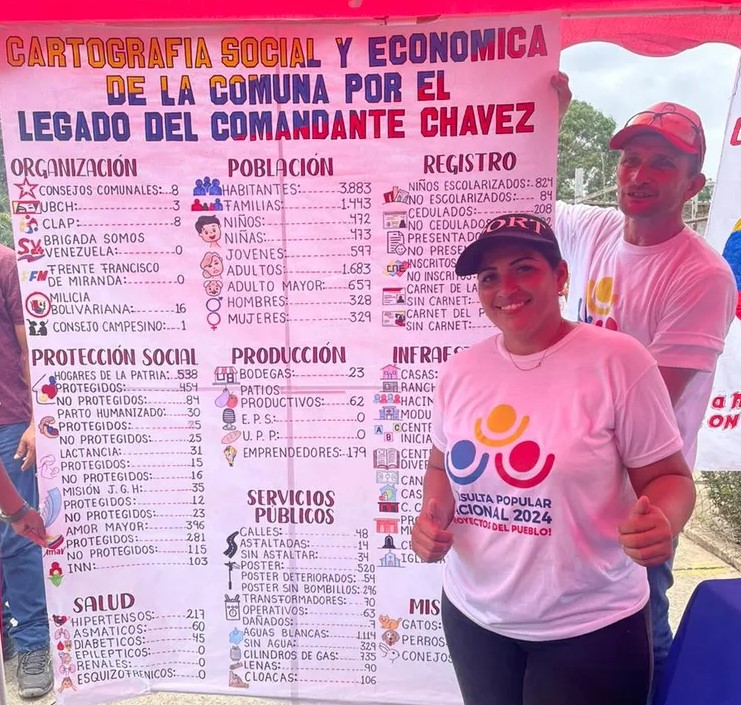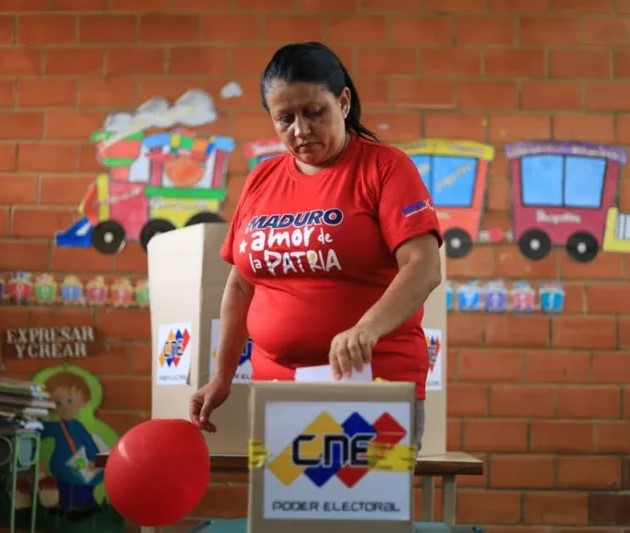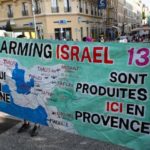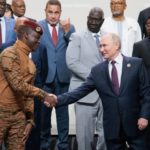Little by little, Venezuelans walked up the narrow streets of the Cátia neighbourhood to cast their votes at the polling stations of the Altos de Lídice commune in Caracas (1). The elections this Sunday were not about choosing a deputy, a mayor or a governor. The aim of this popular consultation was to define the priority projects for each of the 4,500 communal self-governments in the country. In the streets, we noted the strong participation of women. Carmen Forjado – coordinator for the electoral team of the municipality Golpe de Timón says: “We are 70% of the voters; we left our home, our comfort, to give ourselves the means to act on the political level. We feel like we stand for this whole process.”
15,617 polling stations spread across 49,000 municipal councils in Venezuela opened their doors early in the morning to the voters who are going to choose the priorities of each municipality, from seven options. The selected project will be sent to the Ministry of Municipalities and Social Movements for funding. It will be implemented with the help of the inhabitants themselves, with the material assistance of the revolutionary government. The projects on which Venezuelans vote are drinking water, electrical services, improvement of public services, health system, education, sports, public transportation, waste management, maintenance of streets or roads, environmental protection, productive projects, industrial processes, the agricultural production system, etc. Whether it is buying ambulances, improving the supply of drinking water or to build a public Wi-Fi network, the Venezuelans recognise in this vote an advanced step in participatory democracy.
The political character of these elections goes beyond party politics. Communes are a concept of the new state, proposed by President Hugo Chávez. Its objective remains clear: that the State is managed from the bottom up and that the decisions of the municipal councils take their full place in the joint people/government decision-making. This is not a simple citizen consultation, as in other countries. Here the result of the vote obliges the State to finance the project chosen by the population.
The winning projects this Sunday were chosen after an in-depth debate within the municipal councils. Through assemblies, residents were listened to and put forward what they considered to be the main demands. From there, the seven most urgent and necessary projects were chosen.
For Dahis Escobar, educator at the Patria Grande Plurinational University, popular participation is fundamental to implementing projects that answer closely to the reality of the municipalities. “It is not a simple representative democracy. I don’t choose someone who promises to carry out something without me knowing whether they will do it or not, or because they have told us that in their opinion this or that project is the best for the community. No. Here, democracy is participatory and direct. We ourselves participate in choosing the projects that we will carry out. The debate serves to listen to the real demands of the population.”
“Vanquish capitalism”
For José Ibarra (infrastructure spokesperson for the socialist municipality of Altos de Lídice), “it is very important to defeat the capitalist state. Before, we were used to a Town Hall. Today, popular power participates on its own territory for the short, medium and long-term projects that are developed. The people themselves, along with the spokespersons of the municipal councils and the Local Supply Committee, participate together in this project for the benefit of the communes.”
Mothers, fathers, grandfathers and grandmothers are accompanied by their children, grandchildren and nephews. Entire families went to the polls on this Sunday which promised to be cloudy in Caracas. The Ministry of Communes expected that at least 1.3 million Communards would participate in the consultation. Because they are simple and quick to implement, the government calculates that the selected projects will be finalized within a maximum of two months. The work will be managed by the municipalities themselves through the Communal Bank, a body created by the National Assembly within its vast array of popular power laws. Each municipality has its own bank and a unit which concentrates the administration of the funds. The bank will receive the money from the ministry, and it will invest it in accord with what was approved in the assemblies.
Contrary to what happens in traditional elections (35 in 24 years of revolution) persons over the age of 15 are eligible to vote. For Dahis Escobar, the presence of young people is a greater guarantee of representativity in the choice of the projects. “Those over 15 opt for the projects of their choice, the important thing being that they will be carried out by the inhabitants of the communities themselves. Each project is for the whole commune. It benefits the whole commune; not one sector or one individual but the whole commune.”

Social and economic mapping of a municipality
” Big day ! The power in our country is finally in the hands of the people,” declared President Maduro, for whom “the right-wing hates popular power. The simple words ‘popular power’ stir-up its contempt and its hatred of assemblies. It never stopped voting against the laws that guarantee it.” The Bolivarian government plans to have the process of consultation and choice of projects happening more often.
The vote was overseen by observers from all over the world posted at different polling booths. The Puerto Rican sociologist Ramón Grosfoguel, famous thinker of decoloniality, was one of them: “This electoral process of popular consultation should be considered by other governments as an example of success. An example of participatory democracy with no precedent in the world. We don’t see this anywhere else in the world. We have witnessed it here, and so it seems normal to us now; but for those who come from outside, it is anything but normal, it is an example.”
Article from LORENZO SANTIAGO in BRASIL DE FATO, Caracas, Venezuela, 22.4.24.
Source : https://www.brasildefato.com.br/2024/04/22/consulta-popular-envolve-49-mil-comunas-na-venezuela-e-escolhe-projetos-prioritarios-para-territorios
Published on the Venezuela Infos website April 23, 2024.
Note : (1) In Venezuela, the Communes are a type of social and political organization based on urban neighbourhoods and rural communities. Created within the framework of the Organic Law of Municipalities promulgated in 2010 by president Hugo Chávez, the Communes are experimenting with a new form of popular self-government. The latter is based on self-management and permanent dialogue with the State. The Communes have priority in the transfer of State resources, and they do not necessarily have to be limited to a state or a municipality; that is to say, the same municipality can cover more than one city. The role of the Communes involves also the economic management of resources. The Law of the Municipal Economy, which underpins the Communes, recognizes several types of organization at economic level, like: the communal enterprises of direct ownership, the family production units, and the communal societies of indirect social ownership. The latter are mixed companies managed half by the State, half by the municipality.
Feature Image: Voting in the Popular Consultation of 21 April 2024.


















